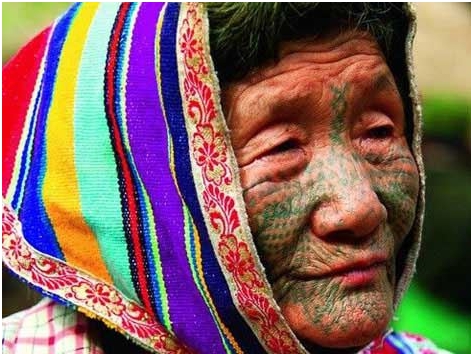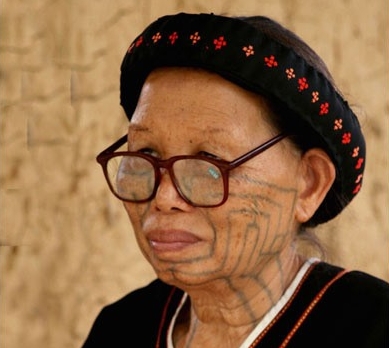
Tattoo, also called "Wenshen" or "Chiqing", refers to piercing sharp tools like pin into the skin and color it so as to form a variety of patterns and veins.
In China, many ethnic groups have the tradition of tattooing. The tattoos of different ethnic groups possess their distinctive regional characteristics and have their own folk legends. The ancient Chinese regarded dragon as the god in charge of water, so people in Wuyue area (present Jiangsu and Zhejiang provinces) who made a living by fishing liked to have dragon, snake or fish scale patterns tattooed on their body, so as to make them similar to the dragon, and hence get safety while fishing. Tattoo is a symbol indicating muscularity and beauty of the Dai ethnic group, and they especially like to tattoo fish scale on their legs, which is also related to the situation that they live beside water. In addition, tattoo has the functions of clan identification and marriage restriction. Various tattoo patterns by people of Li ethnic group, for example, indicates that these people belong to different clans; and tattoo of a woman can indicate her marriage status.

Tattoo, emerging 3500 years ago, was initially used as a punishment. Qingxing, a punishment piercing words on the prisoner's face, is one of such punishments, and, by this, tattoo was attached with the meaning of "evil". After continued evolvement, tattoo has gradually become a measure of personal decoration. Tattoo was once very popular during the Tang, Song, Yuan and Ming dynasties. The tattoo art reached its heyday in the Song Dynasty, during which period, even common people also favored to tattoo on their bodies using pins and inks to symbolize luck and pursue aesthetic feeling. In the classical literary work Water Margin, Monk Lu Zhishen, Jiuwenlong Shi Jin and Swallow Lang Qing all had tattooed on their whole bodies. Tattoo was adored by gallant knights, who regarded it as a heroic measure. There is a folklore that Yue Fei's mother tattooed four words "Absolute Loyalty to Serve the Country (Jing-zhong-bao-guo)" on his back. So, tattoo is deemed to be able to express Attic faith.
Besides original significations, modern tattoo is more regarded as an art and mode to express personal pursuit on aesthetics or personal value. Many scholars specializing in sociology and anthropology have begun to study this pop culture of violent flavor from the popular view.





